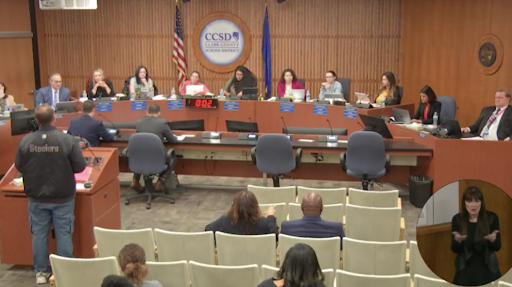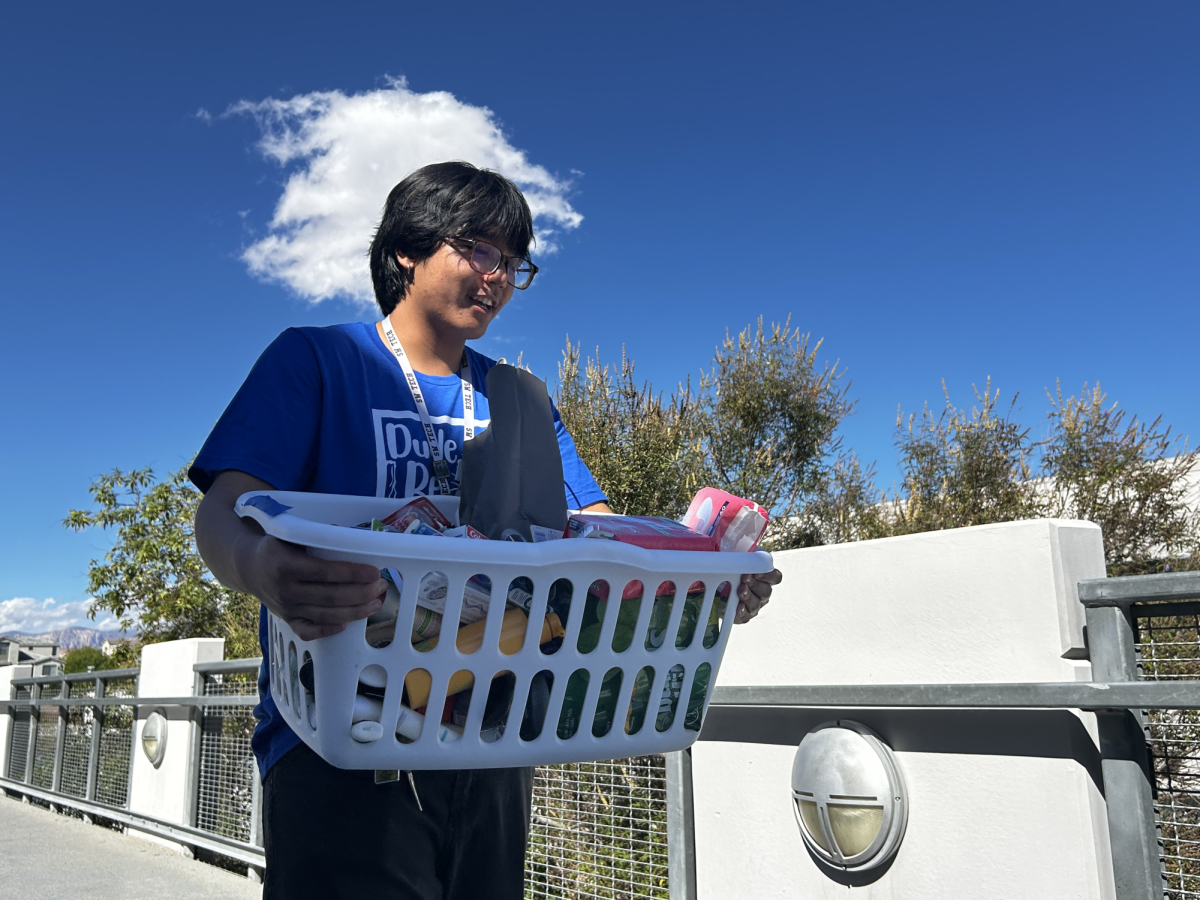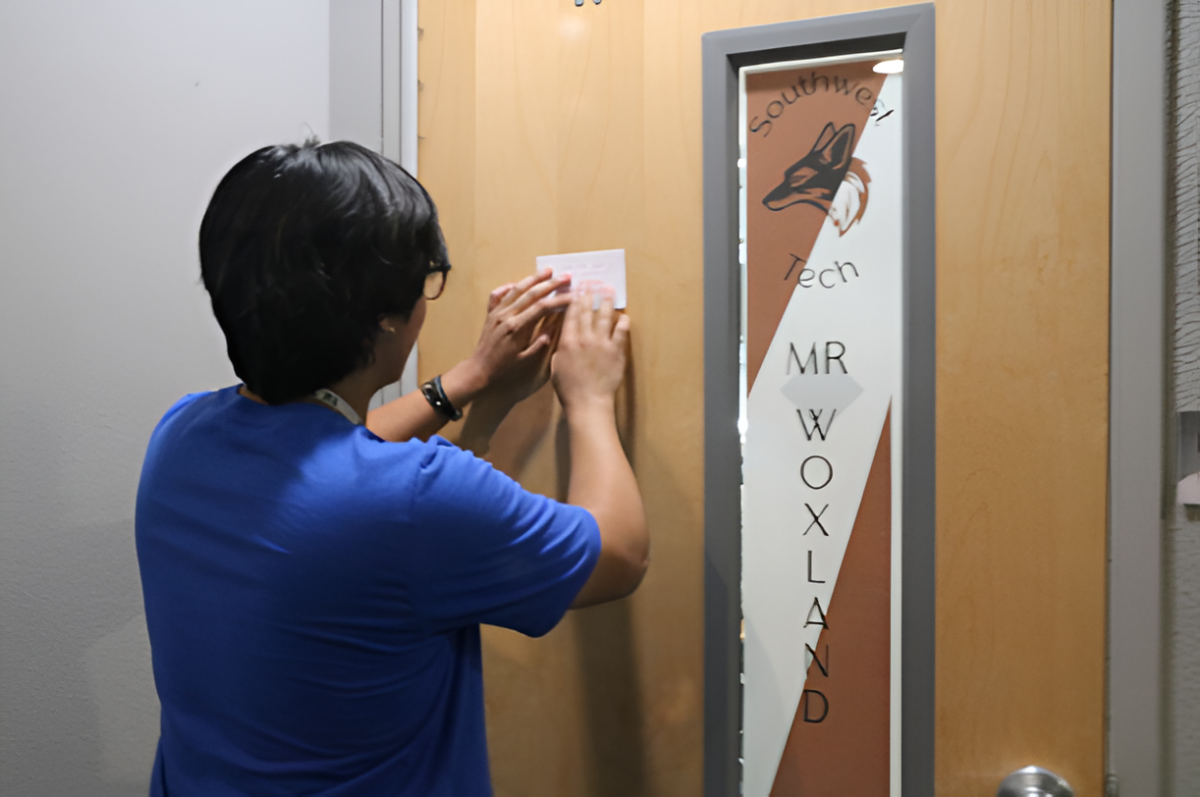With the recent rise in violent incidents at school, CCSD Board of Trustees discussed ways to reduce violence and discipline students.
Many parents and teachers demanded that the district take action to make schools safer and many offered suggestions.
“It’s not about teaching anymore, it’s about maintaining huge, ridiculous classrooms,” Youth Power Project organizer Kathia Sotelo said. “If we want to lower violence in schools, we need smaller classroom sizes so teachers can get a chance to teach. Large classroom sizes encourage a disruptive environment that leads to tension that eventually leads to violence.”
With this in mind, the Board talked about creating a “Prevention Before Apprehension” system, allowing police officers to go into private property and “assess” students. In order for this to occur, many were talking about a grant of $405,672.50 and an additional $96,000 for gate-busters.
“The gate busters, well, that’s a scary word,” District B Trustee Katie Williams said. “They are much like a remote, they look like a cell phone, all they do is decode coded gates so that police officers can get into communities that have them. I’d like the community to understand that oftentimes when police officers go to home visits, they are going to worst case scenarios, and it is a police officer usually that you want there.”
Many were concerned about police entering their communities.
“Students should not be subjected to unannounced visits from school police,” student Diana Burnaby said. “This would be a violation of the student’s privacy. How would you feel seeing police entering your home unannounced, sirens blaring through your neighborhood? Funding should not be used on CCSD police, but rather on mental health professionals that can better assist students.”
CCSD police further explained “Prevention Before Apprehension,” clarifying that officers would go in unmarked cars and bring social workers with them.
“One of the things we came up with is a way to proactively go into the community,” CCSDPD sergeant Dr Steven Ufford said. “The officers go in plain clothes and plain cars. This is a non-enforcement function. We do not want to cast an impression that we are there in any enforcement capacity. Police social workers also go in and offer services and just say ‘How can we help?’”
Trustees voted 4-3 and approved the grant, despite many parents and students speaking up against it. Trustees Evelyn Garcia Morales, Katie Williams, Lisa Guzman, and Lola Brooks voted yes, and President Irene Cepeda, trustee Danielle Ford, and trustee Linda P. Cavazos voted no.
“We know that the role of the police was to protect white supremacy,” WCTA junior Don Davidson said. “[To] increase funding of a corrupt police system to conduct home visits not only puts students’ constitutional rights in the fourth amendment under a dangerous attack, but puts minority students at risk of oppression.”
Another peak point in the meeting was Assistant Superintendent of CCSD John Anzalone‘s presentation, in which he pointed out African American students as the main group for getting suspended during the beginning of the year, as well as October being the peak of suspensions. One of the main reasons CCSD launched the restorative justice program was to lower those numbers.
“I think it’s important to mention here that this data can really inform our principals and our schools as to when those hotspots occur,” Anzalone said. “As we get into the month of October it’s important for our schools to understand that we have to be more vigilant and we have to have more adults out and about.”
Many were visibly upset with the data being presented and parents claimed that there was missing information that was not being presented.
“One of the subject areas I’m an expert in is the school to prison pipeline, and I know what good data looks like,” Dr. Kyle Rogers said. “I know because our presenters here have doctorates too and they know what good data looks like. So then the question I have is, why do we have such bad data in front of us? Why did we not include other forms of discipline, like in-house suspension, RPCs, and the StarOn programs? You see what’s happened is not that the disciplines have reduced, but we changed the category that discipline happens in so that it looks like they’re lower. We haven’t reduced expulsion.”
After the presentation, members of the board still wanted more time efficient solutions for discipline.
“I think this was a great, thorough presentation,” Ford said. “It’s important to recognize the things like how limited we are in resources, the cold hard truth about things like that. The mental health conversation is important. But where I want to focus is on timeliness, we don’t have any time to lose or any students to lose. What’s gonna happen tomorrow? Nothing we do right now is going to impact anything soon.”
Superintendent Jesus Jara will meet with school principals and go over action they should take after violent behavior on campuses.
“We have to address the needs that our children are facing,” he said. “We need to protect and make sure that our staff is safe and able to teach. The numbers here are alarming.”


!["I will be attending Trunk or Treat [for FCCLA]" junior Crystal Li said. "We're gonna use Mr. Harbeson's car, and we will be [hosting three different activities]."](https://southwestshadow.com/wp-content/uploads/2025/10/IMG_0980-1200x900.png)






![Displaying a QR code for students to scan, the flyer allows students to sign up and learn about their desired colleges as they visit throughout the school year. Many schools have had additional presentations for students to learn more about what they offer. “For me, I’m interested in criminal justice,” junior Zion Jefferson said. “I know that UNLV and Nevada State University have this major. But, [the college fair] is going to be beneficial, so I can see what other schools offer as well.”](https://southwestshadow.com/wp-content/uploads/2025/10/IMG_2721-1200x900.jpg)
![Working in the Student Success Office, Attendance Secretary Lordis Depiazza inputs a student’s absence excuse note. Students are required to bring an excuse note to the attendance office within three days of any absence. “Reminding students that being in school is important because it reflects towards your grades and being able to do any activities with the school,” Depiazza said. “[It] seems to get the students' attention about wanting to be in school.”](https://southwestshadow.com/wp-content/uploads/2025/10/IMG_8313-1200x800.jpg)
![Arranging the fabric on the floor for a new project, senior Sapphyre-Ann Leung plans out her attire for the next deadline. With the recent closures, students now had limited resources and less margin for error with the fabric and materials they had in stock while trying to reach strict deadlines. “Joann’s had a lot of high-end fabric for our fashion competitions,” Leung said. “We couldn’t just buy ten yards of fabric from Hobby Lobby or Walmart. Since [Joann Fabrics] is no longer open, we have to buy items online, which is way more expensive.”](https://southwestshadow.com/wp-content/uploads/2025/10/IMG_0038-1200x800.jpg)

